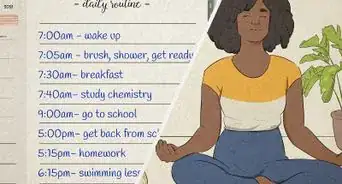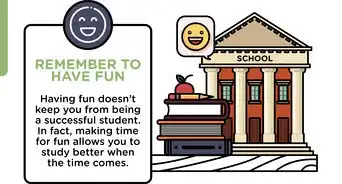This article was co-authored by Alexander Ruiz, M.Ed.. Alexander Ruiz is an Educational Consultant and the Educational Director of Link Educational Institute, a tutoring business based in Claremont, California that provides customizable educational plans, subject and test prep tutoring, and college application consulting. With over a decade and a half of experience in the education industry, Alexander coaches students to increase their self-awareness and emotional intelligence while achieving skills and the goal of achieving skills and higher education. He holds a BA in Psychology from Florida International University and an MA in Education from Georgia Southern University.
There are 12 references cited in this article, which can be found at the bottom of the page.
This article has been viewed 56,578 times.
It’s hard enough getting motivated to study for yourself, let alone helping a friend or colleague to. Helping them to gain confidence through positive feedback and reinforcement, while maintaining their motivation, can encourage anybody to hit the books.
Things You Should Know
- Find a medium that suits you based off your strengths and weaknesses, work on your craft, seek out feedback, and create your personal style.
- To continue improving your art, enroll in formal classes, study great works of art, and connect with other artists.
- Promote your work by circulating a portfolio, finding public space to hang your art, and networking with people in the art world.
Steps
Using Positive Reinforcement
-
1Find out the specifics of what’s keeping them from studying.[1] Often, people will feel discouraged at something that seems too difficult for them. You should ask your friend to talk about what’s hard for them when it comes to studying, and how you can best help them.[2]
- You can ask questions like “What do you feel unsure about? Do you know anyone who could help you understand the material better? Do you need me to help you keep focused while you study?”
-
2Have them speak about their past accomplishments in school. At this point in their education, they have faced multiple stressful situations, and still managed to come out the other side. Ask them about it, saying something like “How did you prepare for the last hard exam you passed?”[3]
- When they’re done explaining, encourage them by saying “If you could overcome the obstacles then, you can do it again now.”
- Throughout their studying, make sure you remind them of this fact.
Advertisement -
3Have them write down their intended goals. Have your friend think about what they specifically want to achieve from studying, or just from this study session. Then have them list the smaller goals they will have to achieve along the way to reach the bigger ones.[4]
- If necessary, have them break down the goals to their smallest individual steps, and begin helping them work through each, one by one.
Helping Them to Maintain Motivation
-
1Set rewards for reaching goals. Have your friend decide on what they’ll earn for reaching their study goals. Perhaps could watch an episode or two of a favorite show, play a video game, go eat a meal they want, etc. Again, have them write it down if necessary.[5]
- Consider having small rewards for completing smaller goals along the way, such as a 10-15 minute study break after they focus for 15-20 minutes.
- Make sure to remind them of the rewards throughout the study session as motivation, saying something like ”Remember, you can go watch or play as much as you want once you’re finished studying.”
-
2Break up difficult subjects. If they have a class that gives them trouble, study that material for shorter amounts of time so they don't get discouraged.[6]
-
3Have them ask questions about the material. Let them write down the questions they want to know about before they start, or as they go along. When they finish or feel they’re ready, have them answer the questions to see if they’ve now learned it.[7]
- If they still aren’t able to answer the questions, narrow down the focus of their studying to just the areas they’re having trouble with.
-
4Teach one another the material. If you’re familiar with the material, take turns having your friend and you teach each other what you’re learning.[8]
- If you’re unfamiliar with it, see how well your friend can teach it to you. Ask questions to have them practice relaying the information.
-
5Suggest having them study in a group or with their friends. Even if it’s not on the same subject matter, having them study with other people may motivate them to work better than by themselves.[9]
- If your friend needs help while studying, have them work with classmates studying the same material.
- Avoid having them study with friends who may only serve as further distraction.
-
6Find someone knowledgeable or interested in the subject to speak with your friend. They may be able to provide answers to questions they have, and insights that could encourage them to better understand the material.[10]
- See if their school or a nearby library doesn’t have a study resource lab or tutor sign-ups. They may even have someone familiar with the material.
- The teacher of the class they’re studying for is a guaranteed resource for the information they need. Let them schedule a time to meet with them if they need something explained.
-
7Teach them about aspects of their life the material applies to. Research the ways in which our day-to-day lives involve the material they’re learning. If your friend needs a sense of practicality to their studying, you can tell them about how the material may play into a situation or scenario people often deal with. It may even get them more interested in learning about it.[11]
- Ask the teacher of the course if they can cite examples of daily use of the material.
-
8Have them associate studying as something they want to do. Practice having them go through these steps when they study, balancing out rewards for accomplishing goals and having them work in groups to stay motivated. If your friend’s interest in the material grows, they may begin to see studying as less of a hassle, wanting to learn more about it naturally, rather than forcefully.
Expert Q&A
Did you know you can get expert answers for this article?
Unlock expert answers by supporting wikiHow
-
QuestionWhat can motivate a person to study if they get discouraged easily?
 Alexander Ruiz, M.Ed.Alexander Ruiz is an Educational Consultant and the Educational Director of Link Educational Institute, a tutoring business based in Claremont, California that provides customizable educational plans, subject and test prep tutoring, and college application consulting. With over a decade and a half of experience in the education industry, Alexander coaches students to increase their self-awareness and emotional intelligence while achieving skills and the goal of achieving skills and higher education. He holds a BA in Psychology from Florida International University and an MA in Education from Georgia Southern University.
Alexander Ruiz, M.Ed.Alexander Ruiz is an Educational Consultant and the Educational Director of Link Educational Institute, a tutoring business based in Claremont, California that provides customizable educational plans, subject and test prep tutoring, and college application consulting. With over a decade and a half of experience in the education industry, Alexander coaches students to increase their self-awareness and emotional intelligence while achieving skills and the goal of achieving skills and higher education. He holds a BA in Psychology from Florida International University and an MA in Education from Georgia Southern University.
Educational Consultant
References
- ↑ Alexander Ruiz, M.Ed.. Educational Consultant. Expert Interview. 4 August 2020.
- ↑ https://www.oxford-royale.com/articles/common-study-problems/
- ↑ https://www.mindtools.com/ax3c2aw/celebrating-achievement
- ↑ https://positivepsychology.com/goal-setting/
- ↑ https://www.reed.edu/academic_support/pdfs/handouts/Rewards.pdf
- ↑ Alexander Ruiz, M.Ed.. Educational Consultant. Expert Interview. 4 August 2020.
- ↑ https://cen.acs.org/careers/career-tips/9-ways-motivate-others/96/i44
- ↑ https://www.oxfordlearning.com/studying-alone-vs-studying-in-a-group/
- ↑ https://learningfundamentals.com.au/blog/5-ways-to-motivate-yourself-to-study-a-boring-subject-andor-complete-a-project/
- ↑ https://www.healthhub.sg/live-healthy/448/buildingasupportivenetwork
- ↑ https://iopn.library.illinois.edu/pressbooks/instructioninlibraries/chapter/learning-theories-understanding-how-people-learn/
- ↑ https://www.health.harvard.edu/healthbeat/foods-linked-to-better-brainpower
- ↑ https://www.ncu.edu/blog/can-music-help-you-study-and-focus#gref





































































